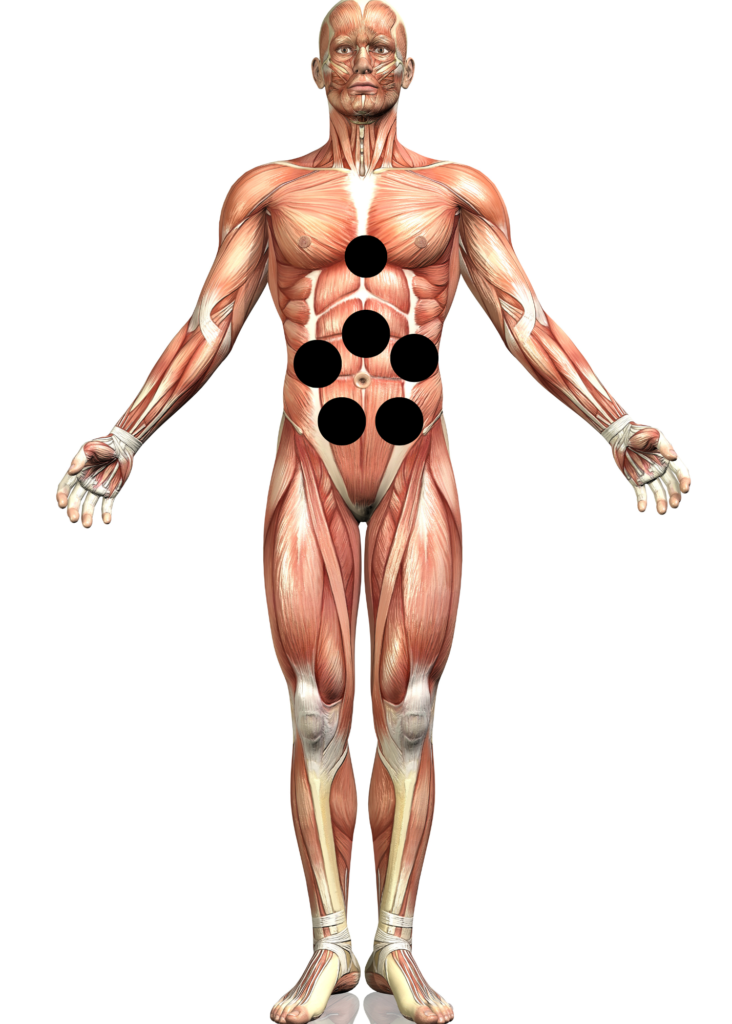No products in the cart.
Bloating & Hijama Cupping Therapy
If you have ever felt that there is an inflated balloon in your abdomen then probably you have a bloated stomach.

What Is Bloating?
Bloating can be described as a condition in which an individual feels full, belly feels tight and often painful. The range of pain could be mild to intense. Before abdominal discomforts were limited to the occasional holiday festivities but now, one in ten individuals are suffering from regular bloating issues. Fortunately, it is a short-term problem that resolves on its own, depending upon what triggered it, could be a large meal or gas complaint.
Symptoms of Bloating
Some common symptoms of bloating are as under:
- Stomach pain
- Discomfort in the abdomen area
- Heartburn & nausea, vomiting
- Diarrhea
- Blood in the stool or vaginal bleeding
- Fever
Reasons of Bloating
Here are some most common causes of bloating:
1- Gas
The most common cause of bloating is gas in the abdomen area. When our gastrointestinal(GI) tract is filled with air or gas we feel bloated. The gas in the digestive system is swallowed air. Gas can be caused by something as simple as the food we consume. Some foods produce gas, for example, some individuals are lactose intolerant, they have problems digesting milk.
2- Constipation
Another common cause of bloating is constipation. In the condition of constipation, an individual may feel uncomfortable or have irregular bowel movements. You may have regular bowel movements and you may still be constipated. The symptoms of constipation may include pebble-like hard stool or straining during a bowel movement or you may still feel full after a bowel movement. The longer the stool stays in the colon, the more time bacteria get to ferment, resulting in gas and bloating.
3- Overeating
It is probably one of the most common causes of bloating.
Narrated Ibn Umar: “Allah’s Apostle said, A believer eats in one intestine(satisfied with a small portion of food) and a kafir (unbeliever) eats in seven intestines (eats too much)”. [ Volume 7. Book 65. No 306]
Eating too much or eating too many fatty foods can make you feel stuffed. Fats keep the stomach full for longer than proteins and carbohydrates. Limited fats in your diet may avoid bloating. It is very important to take smaller portions and of course, eat slowly. Slow eating helps you to prevent overeating.
4- Digestive Disorder
In IBS or Functional Dyspepsia body struggles with digestive disorders. Symptoms include bloating, gas, constipation, nausea, vomiting, anemia, fever and rapid weight loss.
5- Small Intestinal Bacterial Growth (SIBO)
When bacteria in our small intestine overgrows, it may cause problems with our digestion. The bad bacteria may harm the good bacteria and may upset the digestive system. SIBO symptoms may resemble gastrointestinal conditions like gas, nausea, bloating, diarrhea and fatigue.
6- Gynecological issues
Sometimes issues with ovaries or uterus may cause bloating.
7- Swallow air
It may sound strange but swallowing air may indeed cause bloating, gas, abdominal pain and burping. Eat or drink slowly because you are more likely to swallow air when you rush through your meals. Chewing gums, smoking, drinking carbonated beverages, drinking through a straw or sucking hard candies may cause you to swallow air.
8- Food Intolerance
Some people have difficulties digesting specific foods like carbohydrates, lactose, fructose, beans or wheat. Bloating can be avoided by knowing about your dirty insensitivities.
9- Menstruation
Many women experience bloating before or at the time of their menstrual cycle. They feel their abdomen is heavy and swollen. Period bloating is one of the very common symptoms of PMS that may occur 1–2 weeks before the menstrual cycle and it could cause stomach cramps or backaches.
Some other medical conditions that may cause bloating are as under:
Digestive infections
Inflammation
Irregular bowel syndrome
Stomach cancer
Mental health issues
Liver disease
Pelvic inflammatory disease(PID)
Foods that Cause Bloating
Food plays a very important role in the prevention of bloating. Difficult to digest food should be avoided. Bloating is a common problem and it can often be resolved by avoiding some specific food items.
- Research has shown foods that contain sugars called oligosaccharides are very difficult to digest. These are found in wheat, onion, garlic, beans or legumes. For healthy people, FODMAPs are beneficial digestive bacteria but for individuals with irritable bowel syndrome, these foods may cause bloating, cramping or diarrhea.
- Some fruits and vegetables may contain starches and sugars that may cause bloating such as cabbage, cauliflower, prunes, carrots or Brussels sprouts.
- Carbonated drinks are another cause of bloating.
- If an individual is lactose intolerant then they may have a troubled digestive system whenever they consume any dairy product.
- Artificial sweeteners may also cause bloating and gas.
Foods that Help with Bloating
Several foods help to prevent digestive disorders, promote gut health, prevent fluid retention and also help with bloating.

- Berries like strawberries, blueberries, and blackberries are loaded with vitamins, and minerals and are high in fibre which enhances gut health and softens stool to prevent bloating.
- Ginger is a magical herb that can speed up emptying the stomach to restrain bloating and the feeling of fullness.
- Bananas are an excellent source of fibre that helps to prevent bloating and water retention.
- Turmeric contains a compound called curcumin, which helps to improve gut health and reduce symptoms of bloating and constipation.
- Fruits like cucumbers, kiwi, pineapple, apple, papaya, and avocadoes encourage healthy digestion and reduce bloating.
- Oats are loaded with fibre and taking a bowl of oats in the morning may be an easy way to combat bloating.
- Green tea not only hydrates the body, but caffeine also stimulates digestive problems and reduces bloating.
- Yogurt is packed with probiotics and probiotics are very important for gut health, especially for bloating.
- Watermelons are an excellent choice to get more bloat-fighting liquids in your diet.
- Mint tea helps to deal with bloating and indigestion.
How to Avoid Bloating
1- Eat slowly When we eat food fast we swallow air, which causes bloating and gas.
2- Avoid chewing gums or sucking hard candies.
3- Avoid drinking with a straw.
4- Avoid using dairy products or wheat products if you are lactose intolerant or allergic to gluten.
5- Stop smoking.
6- Eat High-fibre foods to prevent constipation.
7- Try natural probiotics like yogurt, kefir, kimchi and miso. Probiotic supplements can also be used to aid digestive symptoms like bloating.
8- Eat smaller portions of food because large portions of food may stretch the stomach and cause the feeling of fullness and bloating.

9- Doing exercise or walking is also important to reduce bloating.
10- Drinking water helps with bloating because water helps soften the food and compact the food to pass through with ease.
11- Most processed foods are low in fibre and high in salt and fats. Salt causes water retention and fats digest very slowly. These things lead to bloating and constipation so better to avoid processed food.
How to Beat Bloating Naturally
If you are troubled by bloating regularly, then probably you should see a doctor. But temporary bloating is very common, there are plenty of home remedies that work very well. Some of them are as under:
1- Drinking lemon water in the morning helps to ease bloating and gas. Lemons contain minerals that aid digestion and stimulate bowel movement.
2- Ginger tea has been used for stomach-related ailments since ancient times. Ginger tea speeds up digestive issues and reduces cramping, gas and bloating.
3- Fennel seeds have traditionally been used for the treatment of digestive disorders. Crush the seeds and boil them in a glass of water and you have a fennel tea to take and enjoy.
4- Cumin seeds can also be chewed directly to get rid of bloating.
5- Chamomile is being used to treat diarrhea, gas, bloating and several digestive issues. Chamomile tea made with flower heads is more beneficial than leaves and stems. Putting some mint leaves in the chamomile tea can give you double the benefits.
6- Individuals with digestive disorders often experience pain in the abdomen area, placing a heating pad on the stomach decreases the pain. The warmth of the heating pad relaxes the muscles in the gut, which helps the gas to move through the intestines.

7- There are several varieties of green tea products in the market that help with indigestion and weight loss. I am going to share the easiest and best recipe for green tea with all of you.
1/2 tp of crushed coriander seeds + 1/2 tsp of cumin seeds + 1 tsp of fennel seeds + 4 black peppercorns + a small stick of cinnamon + 1 ts of crushed ginger + few drops of lemon= Boil them all in a pan with 2 glasses of water in it. Boil until it remains 1 glass of water.
Drink this green tea for a week or two and all your digestive disorders will be resolved by the will of Allah(SWT).
Treatment For Bloating with Hijama Cupping Therapy
Bloating is a very common problem, it can be handled by a few lifestyle changes. Most of the changes are already discussed above.
It is important to see a doctor if lifestyle changes or dietary interventions are unable to resolve bloating issues.
Hijama cupping therapy is believed to be one of the most effective treatments for digestive disorders.
All the functions of the body system are closely related to our thoughts and emotions. Even anxiety and stress affect our digestive system. As a result of the stress, our body feels congested and bloated. Cupping may release congestion and stagnation and promote healthy digestion. Hijama solves digestive issues by increasing blood flow, improving lymphatic drainage and boosting the natural healing process. Hijama cupping therapy sucks out the stagnated blood, internal heat and several gases and positively affects the overall health.
Dry cupping and moving cupping therapy are beneficial for chronic constipation, gastric issues and bloating. When dry cupping is done, it creates negative pressure and increases the flow of gastric and pancreatic juices. Dry and moving cupping therapy helps in many ways such as treating digestive problems, inflammation and congestion.

For wet cupping, cups are put on the belly or the navel area.

Wet cupping may also break down fatty deposits, clear out the congested colon and calm the nervous system. Hijama relaxes the muscles and when fresh blood flows to the cupped area, it increases platelets and growth factors needed for stimulation and healing of all the organs in the body. In the bottom line, it improves the peristalsis and secretion of digestive juices.
Abu Huraira (May Allah be Pleased with Him) reported that the Messenger of Allah (P.B.U.H) said, “ If there was something excellent to be used as a remedy, then it is cupping(Hijama)”. [Sunan Abu Dawed, Sunan Ibn Maja].





Leave a Reply